JICA’s first-ever remote treatment support for COVID-19 in developing countries
2021.10.01
With the global spread and prolonged COVID-19 infections, the number of critically ill patients in intensive care units (ICUs) is increasing in many countries. At the same time, in developing nations, treatment systems are facing over-capacity due to insufficient expertise and skills specialized in intensive care, as well as facilities and equipment for isolation beds.
In December 2020, JICA began conducting a world-wide-scale-survey to formulate health projects using remote technology to support ICU care provision in developing countries. This is JICA’s first-ever approach to remotely provide technical advice and training. It connected intensive care specialist doctors and nurses in Japan with ICU medical professionals at hospitals in developing countries via Japan’s own telecommunication system. JICA is taking on the challenge to improve COVID-19 treatment systems overseas through the use of digital technology under the mobility restrictions.
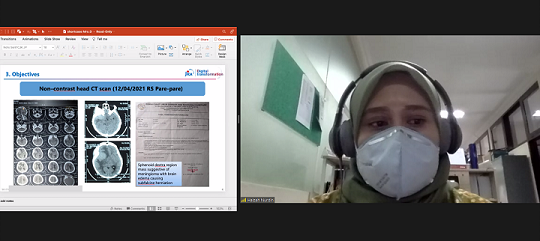
A doctor receiving remote training (Indonesia)
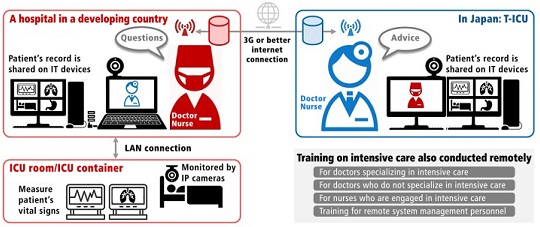
Overview of the remote support
First of all, pilot projects for the East-West Medical College Hospital in Dhaka, the capital of Bangladesh, and other hospitals have been launched. A pilot project includes the installation of Japan’s own tele-ICU communication system, online training, and preparatory meetings for medical professionals to share knowledge.
Shib Shonkar Goshwami, senior medical officer, who participated in the training at the hospital, said, “At the ICU Conference on critically ill patients, I was able to gain a deep understanding about emergency care, and treatment procedures and guidelines in Japan through discussions with Japanese doctors,” and expressed his strong desire for continued support. Mohammad Balayet Hossen, nurse manager of the ICU, said, “Through online but direct instruction by Japanese specialists, not only has nursing care proficiency for COVID-19 patients improved, but also the general quality of nursing care in the ICU has been upgraded.” The medical staff in the field have acquired specialized knowledge and skills, and the treatment system is steadily being enhanced.
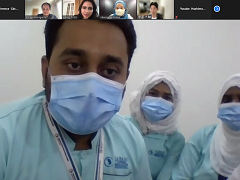
Bangladeshi nurses receiving training on how to remotely care for patients in the ICU
This tele-ICU service has been implemented by T-ICU Co. Ltd. (Kobe), which provides remote intensive care service..
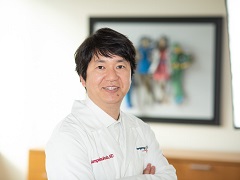
Dr. TSUKUDA Jumpei of T-ICU
TSUKUDA Jumpei, a doctor affiliated with T-ICU, explains tele-ICU support in developing countries as follows. "Although some communication uncertainties exist due to differences in medical standards, patient backgrounds, and languages, medical professionals in all countries share the desire to better help patients. In addition to evidence-based treatment, we are expecting that our advice on intensive care methods, in line with pathophysiology and experiences, will help patients recover from their symptoms, as well as improve the quality and cost of medical care.”
JICA, together with T-ICU, has conducted surveys among 15 countries to determine how the tele-ICU communication system can be effectively utilized in developing countries. Based on the results, JICA will expand the projects to many other parts of the world, such as Indonesia, Tonga, Palau, Kenya, Senegal, El Salvador, Bolivia, Guatemala, and Mexico (*see below).
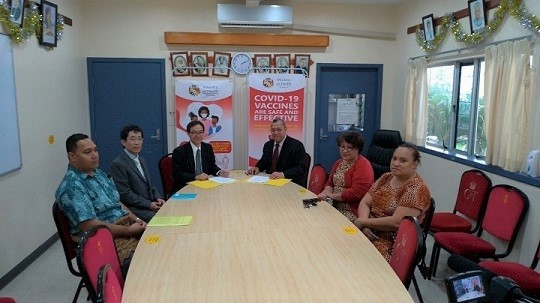
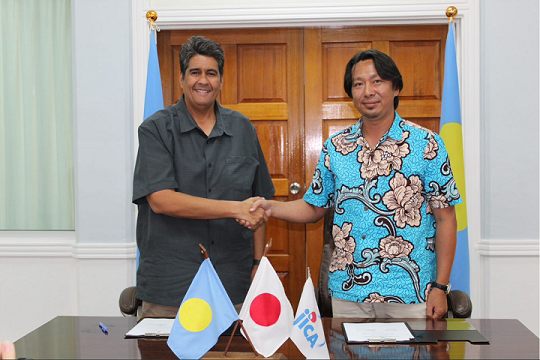
Signing ceremonies were held in Tonga (upper photo) and Palau (lower photo) in July for the Project for Capacity Development of ICU Using Telemedicine under COVID-19 Pandemic
There is still no end in sight for the COVID-19 pandemic globally. JICA launched its "Initiative for Global Health and Medicine" last year, which aims to strengthen the health and medical care system in developing countries under the unprecedented pandemic. With physical restrictions put in place to avoid people’s movement and contact, JICA will continue exploring methods of cooperation on a remote basis, making full use of digital technology, including this example of tele-ICUs system.
Looking towards the future, SAITO Mikiya, director general of Office for STI&DX (Science, Technology and Innovation, and Digital Transformation), JICA, says, “Promoting digital transformation (DX) is essential for solving today’s social issues. In addition to tele-ICU support in the healthcare field, we will take on the challenges of DX initiatives in various fields of international development.”
[Details on medical support using the tele-ICU system]
Project Title: Project for Capacity Development of ICU Using Telemedicine under COVID-19 Pandemic
Target countries: Indonesia, Tonga, Palau, Senegal, El Salvador, Guatemala, Mexico, Bolivia, etc. (countries so far confirmed)
*Kenya (Coast General Teaching and Referral Hospital, Mombasa) is being implemented under the Technical Cooperation “Partnership for Health Systems Strengthening in Africa (PHSSA) Phase 2.”
Planned implementation period: 12 to 15 months
Implementing Agency: Supervising ministry of each country (mainly Ministry of Health)
Target regions:
(1) Indonesia: The University of Indonesia Hospital, West Java Province; The Hasanuddin University Hospital, South Sulawesi Province
2) Tonga: The Vaiola Hospital, Nuku'alofa
3) Palau: The Belau National Hospital, Koror
4) Senegal: The Dalal Jamm Hospital
5) El Salvador: El Salvador National Hospital, San Salvador
6) Guatemala: San Vicente Hospital, Guatemala City
7) Mexico: Agustin O’horan General Hospital; Valladolid Temporary Care Center, Yucatan
8) Bolivia: The Japanese Hospital, Santa Cruz Province
Specific activities:
1) Facilities and equipment: Telemedicine communication systems, temporary ICU medical facilities, and medical equipment for intensive care
2) Consulting services/ soft components: Training and technical advice relating to remote intensive care by Japanese ICU doctors and nurses
scroll